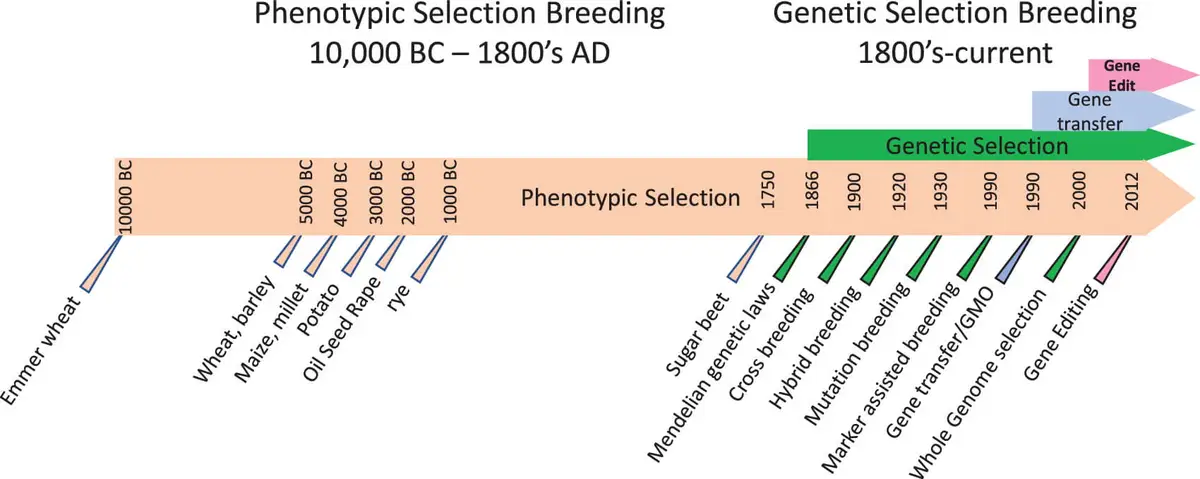Genetically-selected crop breeding has increased yields more than 600% over 2 centuries. Gene editing could dramatically accelerate that
Genetically-selected crop breeding has increased yields more than 600% over 2 centuries. Gene editing could dramatically accelerate that


Humans have improved plants for their utility through selective self-pollination, crossing, and progeny selection for >10,000 years, largely based on physical characteristics. Less than 200 years ago, the genetic basis of heritability in selection was revealed, enabling breeders to accelerate genetic gain.
Gene editing is clearly a major breakthrough in the crop improvement. In many ways, we are at a similar juncture today with genome editing as we were with GMO development in late 1980s and early 1990s, when there was much excitement about the possibility of biotechnology in transforming agriculture.
Today, we see a gene-editing landscape that is rich with entrepreneurial start-up energy as barriers to entry are significantly lower than GMO research. As a result, several new products are near commercialization, and the pace of new product development will only grow as more companies, organizations, and institutions invest in the technology.

As gene editing develops, it is important we learn from the history of past innovations and ensure its use balances the needs of agriculture and food production, societal acceptance, accessibility, and oversight. Now is the time to apply these learnings.
This is an excerpt. Read the original post here.

 | Videos | More... |

Video: Nuclear energy will destroy us? Global warming is an existential threat? Chemicals are massacring bees? Donate to the Green Industrial Complex!
 | Bees & Pollinators | More... |

GLP podcast: Science journalism is a mess. Here’s how to fix it

Mosquito massacre: Can we safely tackle malaria with a CRISPR gene drive?

Are we facing an ‘Insect Apocalypse’ caused by ‘intensive, industrial’ farming and agricultural chemicals? The media say yes; Science says ‘no’
 | Infographics | More... |

Infographic: Global regulatory and health research agencies on whether glyphosate causes cancer
 | GMO FAQs | More... |

Why is there controversy over GMO foods but not GMO drugs?

How are GMOs labeled around the world?

How does genetic engineering differ from conventional breeding?
 | GLP Profiles | More... |

Alex Jones: Right-wing conspiracy theorist stokes fear of GMOs, pesticides to sell ‘health supplements’




 Viewpoint — Fact checking MAHA mythmakers: How wellness influencers and RFK, Jr. undermine American science and health
Viewpoint — Fact checking MAHA mythmakers: How wellness influencers and RFK, Jr. undermine American science and health Viewpoint: Video — Big Solar is gobbling up productive agricultural land and hurting farmers yet providing little energy or sustainabilty gains
Viewpoint: Video — Big Solar is gobbling up productive agricultural land and hurting farmers yet providing little energy or sustainabilty gains Trust issues: What happens when therapists use ChatGPT?
Trust issues: What happens when therapists use ChatGPT? Fighting deforestation with CO2: Biotechnology breakthrough creates sustainable palm oil alternative for cosmetics
Fighting deforestation with CO2: Biotechnology breakthrough creates sustainable palm oil alternative for cosmetics California, Washington, Oregon forge immunization alliance to safeguard vaccine access against federal undermining
California, Washington, Oregon forge immunization alliance to safeguard vaccine access against federal undermining 30-year-old tomato line shows genetic resistance to devastating virus
30-year-old tomato line shows genetic resistance to devastating virus The free-range chicken dilemma: Better for birds, but with substantial costs
The free-range chicken dilemma: Better for birds, but with substantial costs ‘You have to treat the brain first’: Rethinking chronic pain with Sanjay Gupta
‘You have to treat the brain first’: Rethinking chronic pain with Sanjay Gupta
